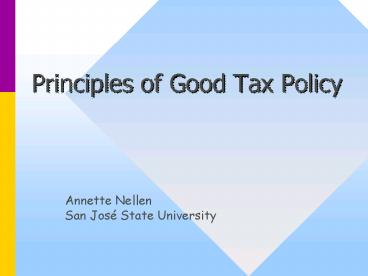Principles of Good Tax Policy PowerPoint PPT Presentation
1 / 19
Title: Principles of Good Tax Policy
1
Principles of Good Tax Policy
- Annette NellenSan José State University
2
Tax Policy Concept Statement 1
- AICPA - Guiding Principles of Good Tax Policy A
Framework for Evaluating Tax Proposals - created as preliminary step to analyzing tax
reform proposals - but - also useful for analyzing any tax proposal
- any size, any degree, any level - basically - Adam Smiths tenets 6 more
3
Purpose of the Framework
- To answer the question
- How should proposals to change existing tax
rules be analyzed.
4
Equity Fairness
- Similarly situated taxpayers should be taxed
similarly.
- Horizontal and vertical equity.
- Fairness (or really, the perception of
fairness). - Should really look at entire range of taxes a
taxpayer is subject to.
5
Certainty
- Tax rules should specify when the tax is to be
paid, how it is to be paid, and how the amount to
be paid is to be determined. - Certainty, rather than ambiguity.
- Ability to determine tax base and rate.
- Basically, the level of confidence that exists
that the tax is being calculated correctly.
6
Convenience of Payment
- A tax should be due at a time or in a manner that
is most likely to be convenient for the taxpayer. - Helps ensure compliance.
- Appropriate payment mechanism depends on amount
of liability and ease of collection.
7
Economy of Collection
- The costs to collect a tax should be kept to a
minimum for both the government and taxpayers. - How many revenue officers are needed?
- Closely related to simplicity principle.
8
Simplicity
- The tax law should be simple so that taxpayers
can understand the rules and comply with them
correctly and in a cost-efficient manner. - Reduces the amount of errors (intentional and
unintentional). - Increases respect for the system (and therefore
higher compliance). - Enables taxpayers to understand tax consequences
of their transactions.
9
Why are federal income taxes so complex today?
- Use of IRC to do more than raise revenue.
- Numerous and frequent changes.
- Complex transactions.
- Anti-abuse rules.
- Law makers dont prepare own returns.
- Desire for accuracy in measuring TI.
- Desire to limit certain rules to certain
taxpayers (EX phase-outs, special definitions,
etc.) - Lack of political will or perhaps true
simplification constituency.
10
AICPA Guiding Principles for Tax Simplification
- Make simplification a priority
- Seek simplest approaches
- Minimize compliance burdens
- Reduce frequency of tax law changes
- Consider administrative burdens
- Avoid limited applicability
11
Neutrality
- The effect of the tax law on a taxpayers
decisions as to how to carry out a particular
transaction or whether to engage in a transaction
should be kept to a minimum. - Taxpayers should not be unduly encouraged or
discouraged from engaging in certain activities
due to tax law. - Primary purpose of tax system is to raise
revenue, not change behavior.
12
Economic Growth Efficiency
- The tax system should not impede or reduce the
productive capacity of the economy. - Tax system should be aligned with the economic
goals of the jurisdiction imposing the tax. - For example, should be aligned with
jurisdictions economic goals for economic
growth, capital formation and intl
competitiveness. - Should not favor one industry or type of
investment at the expense of others.
13
Neutrality vs. Economic Growth
- In conflict?
- Not necessarily.
- Taxes do have impacts.
- EX need depr rule to measure TI. 30 yr life vs
3 year life for chip manuf equip will both
measure TI, but have different economic effects. - Should be cognizant of what economic goals are
- Also, govt may WANT to have an impact through
the tax law to achieve an economic goal. EX
bonus depr on new equipment research credit
14
Transparency Visibility
- Taxpayers should know that a tax exists and how
and when it is imposed upon them and others. - Enables taxpayers to know the true cost of
transactions. - Enables taxpayers to know when tax is being
assessed or paid and to whom.
15
Minimum Tax Gap
- A tax should be structured to minimize
noncompliance. - Tax gap amount owed less amount collected.
- Procedural rules needed to attain compliance.
- Generally, is a need to strike a balance between
(a) desired level of compliance and (b) costs of
enforcement and the level of intrusiveness of the
tax system.
16
Appropriate Government Revenues
- The tax system should enable the government to
determine how much tax revenue will likely be
collected and when. - Need to have some level of predictability and
reliability to enable governments to know how
much will be collected and when. - Generally, government realizes better stability
with a mix of taxes.
17
Challenges
- Desire to use the tax law for more than raising
revenue. - Frequent changes to the tax laws.
- Not all ten principles can be achieved to same
degree for all proposed changes - need to strike
a balance though.
18
Example Charitable deduction for non-itemizers
- Problem areas
- Equity (how are taxable income and ability to pay
to be measured?) - Certainty (more recordkeeping)
- Simplicity (not as simple as just taking the
standard deduction) - Neutrality (tax law would encourage donations)
- Minimum tax gap (many might believe they should
claim something)
- No problem with
- Convenience of payment
- Transparency
- Appropriate government revenues
19
In-class examples
- Increase excise tax on motor fuel by 12 per
gallon - New federal tax collected by states to help
reduce GHG and preserve oil

